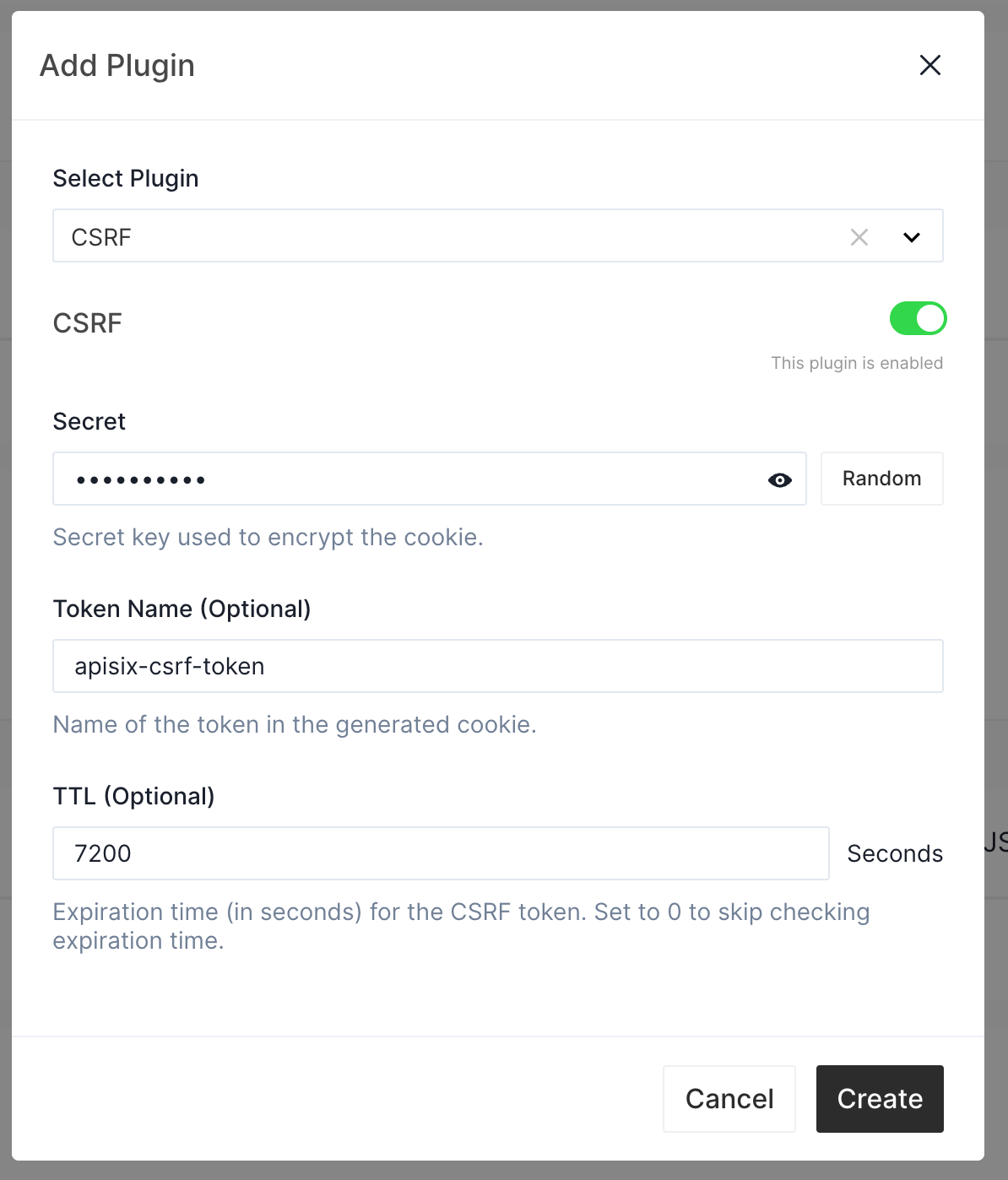Enable CSRF Prevention
Cross-site request forgery, aka CSRF, is a web security vulnerability. An attacker can cause the victim to execute an action unintentionally.
This guide will tell you how to prevent the CSRF attack with the help of the API7 Cloud CSRF plugin.
Before you go ahead, ensure you know the essentials about CSRF, including its impacts, how it works, and the standard way to prevent it.
The CSRF plugin will generate a CSRF token for API requests and pass it through the Set-Cookie header so that the browser will set the
CSRF token to Cookie. The subsequent requests should also take the CSRF token in the request headers. The CSRF plugin will check if the cookie and request header token matches. Invalid requests will be rejected directly by Apache APISIX.
The CSRF plugin is not available in the Free plan. Please see the Pricing Page for details.
Prepare the Environment
Deploy Apache APISIX
Please refer to How to Deploy Apache APISIX to learn how to deploy Apache APISIX and connect it to API7 Cloud. In this guide, we'll deploy an Apache APISIX instance on Docker.
Create Service and Route
We'll create a service with the following details in this guide.
- The service name is
csrf-app. - The path prefix is
/v1. - The HTTP Host is
csrf.httpbin.org. - The upstream URL is
https://httpbin.org.
Besides, we'll create a route inside the csrf-app Service.
- The route name is
anything. - The path is
/anything(prefix match), and strip the path prefix. - It accepts all HTTP methods.
If you don't know how to configure a service and route, please refer to the Getting Started guides first
Configure CSRF Plugin
Let's create the CSRF plugin on the csrf-app Service.

The token name is apisix-csrf-token, it will be the header and Cookie key to pass the CSRF token, and it will expire after two hours (since it was generated).
Test CSRF Plugin
Let's first send a request to the anything route without the CSRF token.
curl http://127.0.0.1:9080/v1/anything -H 'Host: csrf.httpbin.org' -i
HTTP/1.1 200 OK
Content-Type: application/json
Content-Length: 410
Connection: keep-alive
Date: Thu, 11 Aug 2022 07:19:04 GMT
Access-Control-Allow-Origin: *
Access-Control-Allow-Credentials: true
Server: APISIX/2.15.0
Set-Cookie: apisix-csrf-token=eyJzaWduIjoiMDM0N2ZkY2EzNTg4ZGE2MjFhM2U0ZjhlN2Y5MjM0ZWUyNzhiOTBjMDg2MzcwYjhhZTkzNDUwNGU4NzdlYjVjNCIsInJhbmRvbSI6MC43MzM0ODQwNTgxMDY3NywiZXhwaXJlcyI6MTY2MDIwMjM0NX0=;path=/;SameSite=Lax;Expires=Thu, 11-Aug-22 09:19:05 GMT
{
"args": {},
"data": "",
"files": {},
"form": {},
"headers": {
"Accept": "*/*",
"Host": "csrf.httpbin.org",
"User-Agent": "curl/7.76.1",
"X-Amzn-Trace-Id": "Root=1-62f4ad68-151d2b2847fe6a0b0f80ce6c",
"X-Forwarded-Host": "csrf.httpbin.org"
},
"json": null,
"method": "GET",
"origin": "172.17.0.1, 61.241.66.251",
"url": "https://csrf.httpbin.org/anything"
}
Since GET is a safe method, Apache APISIX won't intercept it even if we don't take the CSRF token.
Safe HTTP methods are GET, HEAD, and OPTIONS.
Now let's send a POST request.
curl http://127.0.0.1:9080/v1/anything -H 'Host: csrf.httpbin.org' -i -XPOST
HTTP/1.1 401 Unauthorized
Date: Thu, 11 Aug 2022 07:20:22 GMT
Content-Type: text/plain; charset=utf-8
Transfer-Encoding: chunked
Connection: keep-alive
Server: APISIX/2.15.0
Set-Cookie: apisix-csrf-token=eyJzaWduIjoiYjcxZmQzN2U4ZWViNzk4YTg0ZThmYjZlMTNhYWM0ODkxNTViYjQ3ZTg0ZGQ4ODMwNzQ4NDI2NjQ0YzMxMjY3ZSIsInJhbmRvbSI6MC40NjIxMjg0OTI5NDk1NiwiZXhwaXJlcyI6MTY2MDIwMjQyMn0=;path=/;SameSite=Lax;Expires=Thu, 11-Aug-22 09:20:22 GMT
Since POST is unsafe, and we don't take CSRF tokens, the request is rejected by Apache APISIX.
Let's use the CSRF token returned by Apache APISIX and set it to the Cookie and apisix-csrf-token header.
curl http://127.0.0.1:9080/v1/anything -H 'Host: csrf.httpbin.org' -i -XPOST -H 'apisix-csrf-token: eyJzaWduIjoiYjcxZmQzN2U4ZWViNzk4YTg0ZThmYjZlMTNhYWM0ODkxNTViYjQ3ZTg0ZGQ4ODMwNzQ4NDI2NjQ0YzMxMjY3ZSIsInJhbmRvbSI6MC40NjIxMjg0OTI5NDk1NiwiZXhwaXJlcyI6MTY2MDIwMjQyMn0=' -H 'Cookie: apisix-csrf-token=eyJzaWduIjoiYjcxZmQzN2U4ZWViNzk4YTg0ZThmYjZlMTNhYWM0ODkxNTViYjQ3ZTg0ZGQ4ODMwNzQ4NDI2NjQ0YzMxMjY3ZSIsInJhbmRvbSI6MC40NjIxMjg0OTI5NDk1NiwiZXhwaXJlcyI6MTY2MDIwMjQyMn0='
HTTP/1.1 200 OK
Content-Type: application/json
Content-Length: 806
Connection: keep-alive
Date: Thu, 11 Aug 2022 07:21:19 GMT
Access-Control-Allow-Origin: *
Access-Control-Allow-Credentials: true
Server: APISIX/2.15.0
Set-Cookie: apisix-csrf-token=eyJzaWduIjoiMjdhMDczM2JjMDhmNDIxYWE0MWI0ODQyNjhkMWMzMTZhODg1NDA4NzY1YmFmYjkwOGVkODMzNjEzMjhhYTFhMiIsInJhbmRvbSI6MC40ODMyNjM0OTI5NjI2MywiZXhwaXJlcyI6MTY2MDIwMjQ3OX0=;path=/;SameSite=Lax;Expires=Thu, 11-Aug-22 09:21:19 GMT
{
"args": {},
"data": "",
"files": {},
"form": {},
"headers": {
"Accept": "*/*",
"Apisix-Csrf-Token": "eyJzaWduIjoiYjcxZmQzN2U4ZWViNzk4YTg0ZThmYjZlMTNhYWM0ODkxNTViYjQ3ZTg0ZGQ4ODMwNzQ4NDI2NjQ0YzMxMjY3ZSIsInJhbmRvbSI6MC40NjIxMjg0OTI5NDk1NiwiZXhwaXJlcyI6MTY2MDIwMjQyMn0=",
"Cookie": "apisix-csrf-token=eyJzaWduIjoiYjcxZmQzN2U4ZWViNzk4YTg0ZThmYjZlMTNhYWM0ODkxNTViYjQ3ZTg0ZGQ4ODMwNzQ4NDI2NjQ0YzMxMjY3ZSIsInJhbmRvbSI6MC40NjIxMjg0OTI5NDk1NiwiZXhwaXJlcyI6MTY2MDIwMjQyMn0=",
"Host": "csrf.httpbin.org",
"User-Agent": "curl/7.76.1",
"X-Amzn-Trace-Id": "Root=1-62f4adef-23fd2d6e4df7a862059ab882",
"X-Forwarded-Host": "csrf.httpbin.org"
},
"json": null,
"method": "POST",
"origin": "172.17.0.1, 61.241.66.251",
"url": "https://csrf.httpbin.org/anything"
}
Since this request contains the CSRF token on Cookie and the apisix-csrf-token header, it passes the check and reaches the upstream.